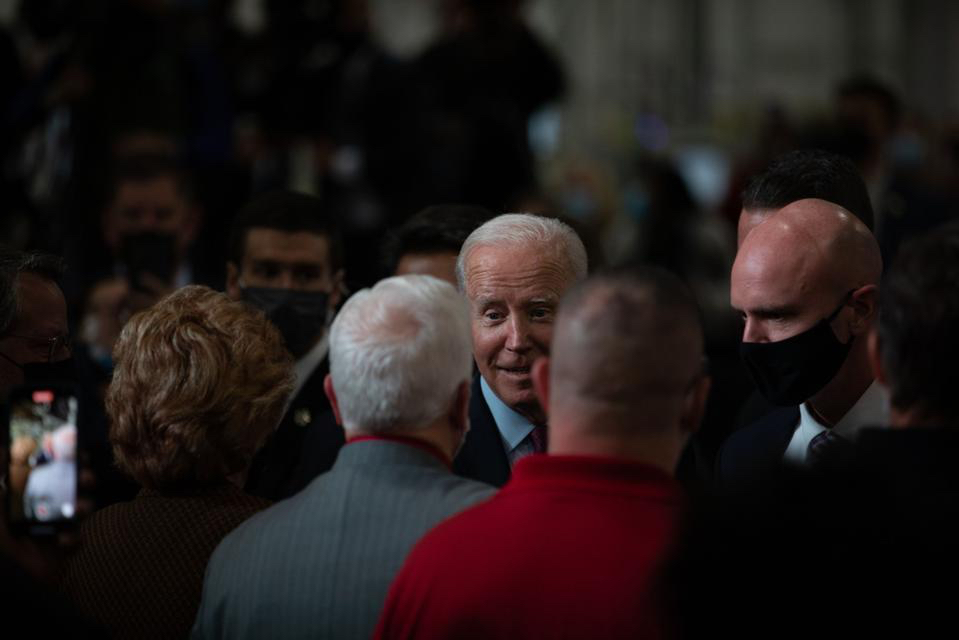13 Dec Forbes : Why Biden’s Tax Credit For Union-Made EVs Would Hurt U.S. Competitiveness
Media source : Forbes
by Russell Flannery, Forbes Staff Asia
Dec 13, 2021,08:35am EST

Unions currently have more backing in the U.S. than in many years. According to a survey by the Gallup polling organization released in September, support is at 68%, the highest level since 1965. On Thursday, Starbucks workers attracted national headlines by making their store in Buffalo the company’s first in the U.S. to unionize.
So it’s no surprise to hear President Joe Biden, as part of his big-spending “Build Back Better” plan, back hefty tax credits for customers that buy an electric vehicle made at a unionized U.S. factory. Though his pitch to unions may help unpopular Biden in polls, they may not be such a good thing for overall U.S. competitiveness, however.
“Favoring the UAW (United Auto Workers) workforce does nothing to bolster the competitiveness of the nation,” said Bill Russo, the founder and CEO of Automobility, a Shanghai-based industry advisory company. “In fact, it does the opposite: it weakens the leaders to the benefit of the laggards. The legacy structural weaknesses in cost structures just get reinforced.”
Russo, an American expat, has three decades of auto industry experience and had a front row seat as China has surpassed the U.S. as the world’s largest automaker and poured capital into in EVs. He earlier ran Chrysler’s business in Asia before switching to consulting.
The biggest winner in the U.S. EV field today is Tesla, which isn’t unionized; it holds an early mover advantage over older rivals. Foreign makes are also in the EV market mix. The European Union last week criticized the Biden plan, citing unjustified discrimination.
The stakes in the global electric vehicle market are big. The auto industry today is undergoing its biggest transformation since the introduction of the internal combustion engine. China, with an extensive supply chain, is a global leader; the U.S. is playing catch-up.
Russo, who backs a tax credit to encourage consumers to switch to electric vehicles, says the nation with the most economically competitive supply chain will ultimately be a winner in the global competition. “Where EVs and their supply chains are built matters,” Russo said in a text exchange. “This is where the next credit leverage should be focused. Using credits to give companies with a higher burden of legacy labor cost an artificial boost will only permanently addict them to the subsidy and ultimately weaken the strong EV players” in the U.S., he said.
Biden’s plan would provide an additional $4,500 in tax credits to consumers who buy cars made by U.S. manufacturers with union workers, beyond an initial $7,500 that at first would apply to vehicles regardless of where they are made and five years later would apply only to those made in the U.S., the Detroit News reported this month.
The EV credit is part of a sweeping “Build Back Better” package to expand the government’s role in society. The Congressional Budget Office said on Friday it would add to U.S. debt by $3 trillion in the next decade if new programs were made permanent. Biden needs every Democrat vote in the Senate for approval. West Virginia Senator Joe Manchin, a Democrat, has questioned the high cost and other elements; the initiative has no bi-partisan support.
For his part, Tesla CEO Elon Musk has criticized the Biden administration by suggesting it is “controlled by unions,” particularly singling out a White House EV summit earlier this year where leaders from GM, Ford, and the United Auto Workers attended but Tesla wasn’t invited.
See related post:Chinese Billionaires Getting Richer With Clean Energy Businesses
@rflannerychina



Sorry, the comment form is closed at this time.